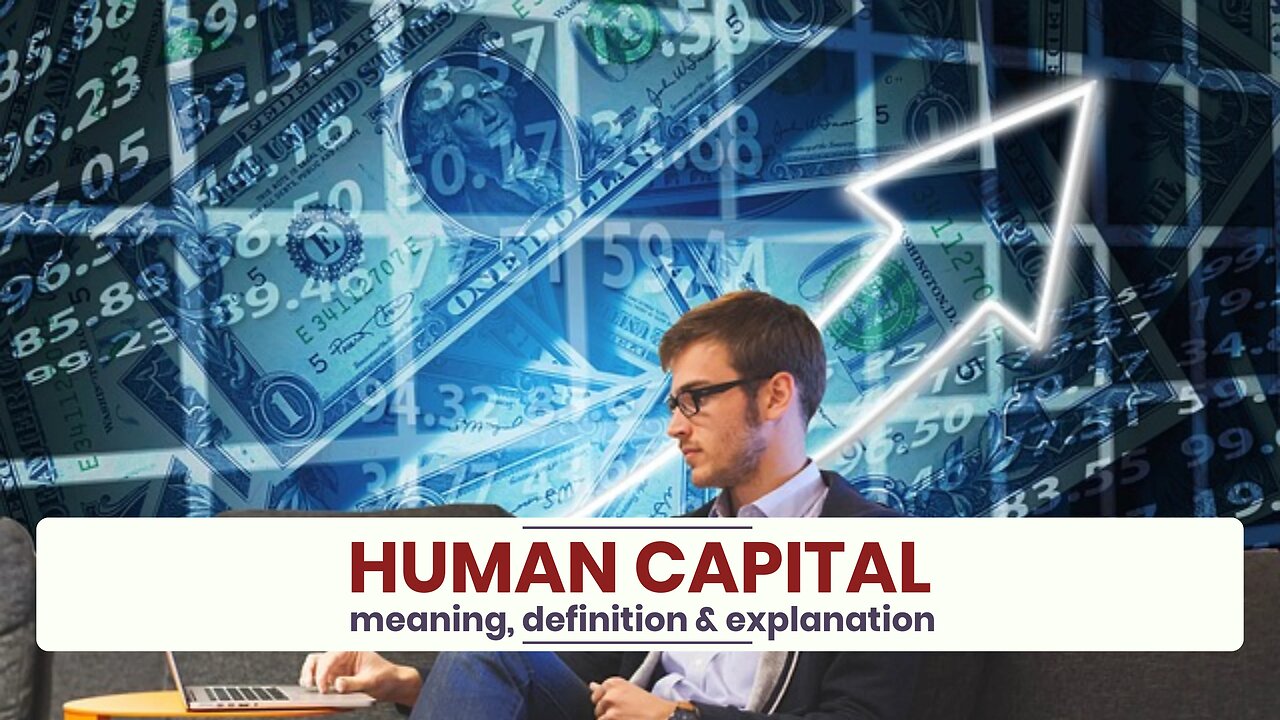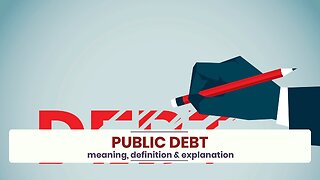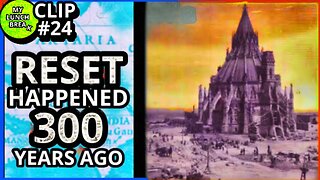Premium Only Content

What is HUMAN CAPITAL?
✪✪✪✪✪
http://www.theaudiopedia.com
✪✪✪✪✪
What does HUMAN CAPITAL mean? HUMAN CAPITAL meaning - HUMAN CAPITAL definition - HUMAN CAPITAL explanation. What is the meaning of HUMAN CAPITAL? What is the definition of HUMAN CAPITAL? What does HUMAN CAPITAL stand for? What is HUMAN CAPITAL meaning? What is HUMAN CAPITAL definition?
Human capital is a term popularized by Gary Becker an economist from the University of Chicago and Jacob Mincer that refers the stock of knowledge, habits, social and personality attributes, including creativity, embodied in the ability to perform labor so as to produce economic value.
Alternatively, Human capital is a collection of resources—all the knowledge, talents, skills, abilities, experience, intelligence, training, judgment, and wisdom possessed individually and collectively by individuals in a population. These resources are the total capacity of the people that represents a form of wealth which can be directed to accomplish the goals of the nation or state or a portion thereof.
It is an aggregate economic view of the human being acting within economies, which is an attempt to capture the social, biological, cultural and psychological complexity as they interact in explicit and/or economic transactions. Many theories explicitly connect investment in human capital development to education, and the role of human capital in economic development, productivity growth, and innovation has frequently been cited as a justification for government subsidies for education and job skills training.
"Human capital" has been and continues to be criticized in numerous ways. Michael Spence offers signaling theory as an alternative to human capital. Pierre Bourdieu offers a nuanced conceptual alternative to human capital that includes cultural capital, social capital, economic capital, and symbolic capital. These critiques, and other debates, suggest that "human capital" is a reified concept without sufficient explanatory power.
It was assumed in early economic theories, reflecting the context, i.e., the secondary sector of the economy was producing much more than the tertiary sector was able to produce at the time in most countries – to be a fungible resource, homogeneous, and easily interchangeable, and it was referred to simply as workforce or labor, one of three factors of production (the others being land, and assumed-interchangeable assets of money and physical equipment). Just as land became recognized as natural capital and an asset in itself, human factors of production were raised from this simple mechanistic analysis to human capital. In modern technical financial analysis, the term "balanced growth" refers to the goal of equal growth of both aggregate human capabilities and physical assets that produce goods and services.
The assumption that labour or workforces could be easily modelled in aggregate began to be challenged in 1950s when the tertiary sector, which demanded creativity, begun to produce more than the secondary sector was producing at the time in the most developed countries in the world.
Accordingly, much more attention was paid to factors that led to success versus failure where human management was concerned. The role of leadership, talent, even celebrity was explored.
Today, most theories attempt to break down human capital into one or more components for analysis – usually called "intangibles". Most commonly, social capital, the sum of social bonds and relationships, has come to be recognized, along with many synonyms such as goodwill or brand value or social cohesion or social resilience and related concepts like celebrity or fame, as distinct from the talent that an individual (such as an athlete has uniquely) has developed that cannot be passed on to others regardless of effort, and those aspects that can be transferred or taught: instructional capital. Less commonly, some analyses conflate good instructions for health with health itself, or good knowledge management habits or systems with the instructions they compile and manage, or the "intellectual capital" of teams – a reflection of their social and instructional capacities, with some assumptions about their individual uniqueness in the context in which they work. In general these analyses acknowledge that individual trained bodies, teachable ideas or skills, and social influence or persuasion power, are different.
-
 1:41
1:41
The Audiopedia
6 months agoWhat is PUBLIC DEBT?
50 -
 3:55:42
3:55:42
STARM1X16
13 hours agoMerry Christmas Fortnite
102K11 -
 2:45:33
2:45:33
Sgtfinesse
13 hours agoMerry Christmas Night
77.3K19 -
 3:51:18
3:51:18
tacetmort3m
1 day ago🔴 LIVE - (MERRY CHRISTMAS) TIME TO SPREAD DEMOCRACY - HELLDIVERS 2 OMENS OF TYRANNY
45.3K2 -
 2:46
2:46
BIG NEM
16 hours agoDiscovering RAKIJA: The Holy Liquer of the Balkans
32.6K3 -
 1:11:38
1:11:38
Film Threat
21 hours agoCHRISTMAS DAY CHILL STREAM WITH CHRIS GORE | Hollywood on the Rocks
151K33 -
 14:22:40
14:22:40
The Quartering
1 day agoYule Log Christmas MAGA Edition With Memes! Come Hang Out!
239K32 -
 38:41
38:41
MYLUNCHBREAK CHANNEL PAGE
1 day agoTimeline Begins in 1800? - Pt 1 & 2
117K71 -
 1:23:41
1:23:41
Game On!
1 day ago $14.04 earnedNetflix NFL Christmas Games Preview and Predictions!
100K13 -
 2:05:07
2:05:07
Darkhorse Podcast
1 day agoWhy Trump Wants Greenland: The 257th Evolutionary Lens with Bret Weinstein and Heather Heying
327K906